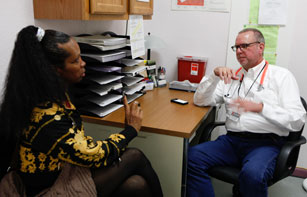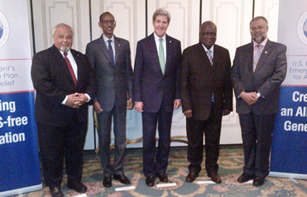
Clinical Director Chuck Cloniger (R) seeing his patient, Tanesh Watson for medical counseling at St. James Infirmary in San Francisco, a medical and social service organization for current and former sex workers of all genders, on 14 June 2012 in California. Credit: UNAIDS/K.Hoshino
On 20 June 2013, the United States (US) Supreme Court struck down section 7631(f) of the United States Leadership Against HIV/AIDS, Tuberculosis, and Malaria Act of 2003 (The Leadership Act). This provision which the Court called the “policy requirement” mandates that no funds made available under the Leadership Act may “provide assistance to any group or organization that does not have a policy explicitly opposing prostitution and sex trafficking.”
The US Supreme Court ruled in response to a challenge filed on 23 September 2005 by 5 civil society organizations against the provision and its negative impact on their efforts to address HIV. The organizations include: Alliance for Open Society International; the Open Society Institute; Pathfinder International; the Global Health Council; and InterAction.
The US Supreme Court held that the policy requirement violates the First Amendment of the US Constitution which protects free speech. In particular, the Court held that the “policy requirement compels as a condition of federal funding the affirmation of a belief that by its nature cannot be confined with the scope of the Government program.” The Court noted that “the First Amendment prohibits the government from telling people what they must say.”
Commenting on the decision of the Court, Purnima Mane of Pathfinder International said, “It has been a long and uphill battle, but we are very happy that the Court has spoken out in defense of our ability to engage with sex workers so we can better put in place programs that protect them and their clients from HIV.”
Respondents had claimed, among other things, that adopting a policy explicitly opposing prostitution may diminish the effectiveness of some of their HIV programs by making it more difficult to work with sex workers—a population at higher risk of HIV infection.
In its 2012 report, the Global Commission on HIV and the Law already noted that, “The pledge puts grantees in an impossible bind. If they don’t sign, they are denied the funds they need to control and combat HIV. If they sign, recipient organisations are barred from supporting sex workers in taking control of their own lives.”
Female sex workers are 13.5 times more likely to be living with HIV than other women of reproductive age in low-income and middle-income countries. In sub-Saharan Africa, the region with the highest HIV prevalence, the pooled HIV prevalence among sex workers is 36.9%.
The involvement and empowerment of sex workers with regard to HIV prevention, treatment and care services has shown to have great impact in reducing HIV infections among both female sex workers and the overall adult population. “The end of this requirement is a significant victory for sex workers and their advocates globally. Our contributions to effective HIV responses have now been recognised,” said Ruth Morgan-Thomas of the Global Network of Sex Work Project.
This shows civil society at its best - advocating for global health for all. No group, including sex workers, should be left behind in our efforts to bring the AIDS epidemic to an end.
UNAIDS Executive Director Michel Sidibé
Given the importance of the case for the global AIDS response, the UNAIDS Secretariat participated as an amicus curiae (friend of the court). In that role, UNAIDS provided public health evidence and human rights arguments to support greater access to funding and resources for organisations engaged in HIV prevention, treatment, care and support services with and for sex workers. UNAIDS main points to the Supreme Court included: 1) Sex workers are among the populations most affected by HIV; 2) engagement with sex workers is essential to an effective response to HIV; and 3) any effective response requires adequate funding for programmes designed to ensure HIV prevention, treatment, care and support for sex workers.
UNAIDS Executive Director, Michel Sidibé praised the groups that were courageous enough to challenge the provision. “This shows civil society at its best - advocating for global health for all. No group, including sex workers, should be left behind in our efforts to bring the AIDS epidemic to an end.”
US funding critical to HIV response
US leadership and generosity has been instrumental in the progress made in the global AIDS response over the last decade. Since the adoption of the Leadership Act, some 45.7 billion dollars have been made available to address HIV worldwide. The President’s Emergency Plan for AIDS Relief (PEPFAR), authorized by the Leadership Act, has been the largest health initiative ever undertaken by one country to address a global health epidemic. Thanks to US funding, access to HIV treatment has been expanded in low- and middle-income countries, and millions of lives are being saved. The decision of the US Supreme Court to strike down the policy requirement will greatly contribute to expand and improve the global AIDS response even further.










